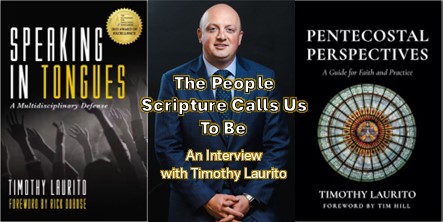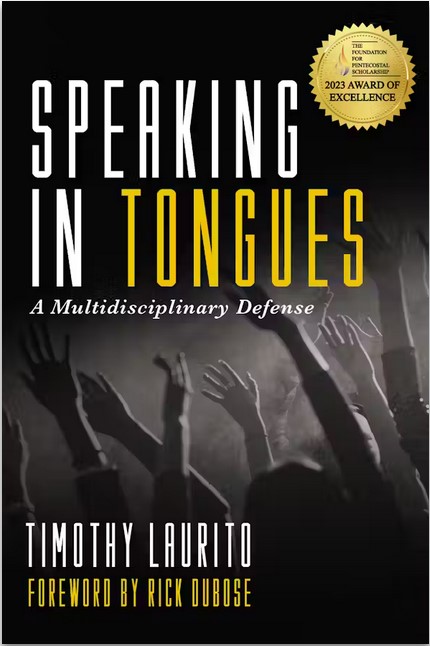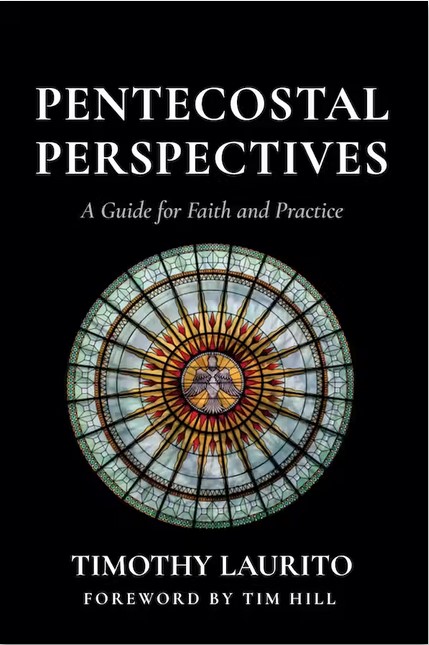The People Scripture Calls Us To Be: An Interview with Timothy Laurito

PneumaReview.com speaks with Dr. Timothy Laurito who is a pastor, educator, scholar, speaker, and award-winning author. He challenges all followers of Jesus to invite the Holy Spirit to move in and through us more powerfully, especially those believers that already acknowledge the Spirit’s work today.
PneumaReview.com: Your first book Speaking in Tongues: A Multidisciplinary Defense addresses a subject that is very controversial in some sectors of the church today. Why is speaking in tongues so controversial since it is mentioned in the Bible?
 Timothy Laurito: Speaking in tongues can be a contentious subject for some within the church, especially for those who hold to a cessationist perspective (spiritual manifestations have ceased). While the cessationist position is losing the debate on the grounds of the biblical evidence, it is still hotly debated.
Timothy Laurito: Speaking in tongues can be a contentious subject for some within the church, especially for those who hold to a cessationist perspective (spiritual manifestations have ceased). While the cessationist position is losing the debate on the grounds of the biblical evidence, it is still hotly debated.
Additionally, speaking in tongues can be controversial, even among those who believe in its practice. The debate here centers on how speaking in tongues should operate within the church. Therefore, it is evident that the subject is controversial on multiple fronts.
PneumaReview.com: In your experience what is the most common objection to the contemporary practice of speaking in tongues?
Timothy Laurito: The most common cessationist objection to speaking in tongues (along with all spiritual manifestations) is that they are no longer needed within the modern church because we now have the Bible. The cessationists argue that spiritual manifestations were necessary in the 1st-century church because they did not have the New Testament. They suggest that spiritual manifestation became unnecessary once the New Testament was completed and the apostles had passed.
While there is historical evidence to show that the charismatic gifts did wane during the Patristic period, they certainly did not completely stop. The Patristic period can be seen to be a time when spiritual manifestations are active and varied. Additionally, the Christian’s ultimate guide for faith and practice should be scripture, and there is no biblical evidence to support the cessation of spiritual manifestations within the church age.
PneumaReview.com: Generally, how would you describe Pentecostal/charismatic believers’ preparedness to biblically defend the practice of speaking in tongues?
Timothy Laurito: My observation is that the average Pentecostal/charismatic Christian has not been properly equipped to defend the practice of speaking in tongues. While many Pentecostals can articulate the significance of their personal encounter with tongue speech, they feel inadequate to defend their experience biblically.
My doctoral research found that 16.7 percent of the several hundred Pentecostals interviewed strongly agreed that they understood the proper function of speaking in tongues within the church. Additionally, only 52.8 percent of Pentecostals interviewed felt confident in explaining the act of speaking in tongues to non-Pentecostals.
PneumaReview.com: What can pastors and church leaders do to help prepare Pentecostal/charismatics to better defend their doctrine?
Pastors and church leaders should create opportunities for Spirit baptism within our weekly worship services.
PneumaReview.com: Do you think that classical Pentecostal churches gives less attention to Spirit Baptism today than they did in the past?
Timothy Laurito: Both from my personal experience and my study of Pentecostal history, I believe that it is evident that the modern Pentecostal church has put less emphasis on Spirit Baptism. This is not merely subjective observations, but a growing number of studies point to an alarming trend within the Assemblies of God (USA): our Pentecostal practice of speaking in tongues is in decline. Statistics reported by the Assemblies of God (USA) reveal that the major worship service attendance grew by 9.1% from 2009 to 2019. However, during this same period, the number of Spirit-baptisms reported was basically flat (1.0% growth). Additionally, the Acts 2 Journey research found that between 2016–2019, most of our conversions took place in our larger churches (200+). However, these same churches experienced a 13% decline in Spirit baptisms during this period.
While faced with the reality that the number of Spirit baptisms in the Assemblies of God USA is trending downward, this should not make us wish for “the good ole days” or cause us to settle for a new normal. Instead, it should drive us to action. It should motivate us to engage this issue with Spirit-inspired confidence and inspire us to see this generation experience Spirit baptism as evidenced by speaking in other tongues.
PneumaReview.com: In your second book Pentecostal Perspectives: A Guide for Faith and Practice you cover several different subjects including: a biblical worldview, Scripture, salvation, discipleship, missions, and prayer. How did you decide which subjects to include in the book?
 Timothy Laurito: The book aims to introduce essential theological themes and then show what a Pentecostal perspective adds to the subject. With this in mind, I chose topics that are foundational for every Christian.
Timothy Laurito: The book aims to introduce essential theological themes and then show what a Pentecostal perspective adds to the subject. With this in mind, I chose topics that are foundational for every Christian.
Additionally, I laid the book out with the intent that each chapter would build upon the previous subject. The book is designed so that the sequence of the chapters helps the reader see how a Pentecostal perspective integrates with the whole Christian faith and practice.
PneumaReview.com: Who is your intended audience for Pentecostal Perspectives?
Timothy Laurito: By presenting a Pentecostal perspective, I am not claiming to represent all perspectives within Pentecostalism. Since there are nearly 650 million Pentecostal adherents worldwide, it would be unwise to assume the content of the book describes all Pentecostals and their perspectives on matters. Like any group of this size, one should expect great diversity within Pentecostal thought.
Instead, the objective is to provide the reader with a clearer understanding of the unique perspectives Pentecostalism contributes to the Christian life. For the Pentecostal, my desire is for you to discover new depths to your experience in the Spirit.
The book also aims to bridge the divide between Pentecostal academia and the Pentecostal pew. My observation has been that the academy and the average churchgoer tend to operate in separate silos with little effort made to connect them. The book offers scholarly footnotes and additional recommended reading at the end of each chapter. However, the tone of the book is conversational and approachable.
PneumaReview.com: What would you say is the greatest need in classical Pentecostal churches right now?
In every era, the people of God need a fresh encounter with the Spirit.
PneumaReview.com: What are their greatest strengths?
Timothy Laurito: The greatest strength of the Pentecostal church has always been its radical openness to the Spirit. This one characteristic has accounted for the unprecedented growth of the Pentecostal movement. As we move forward in the 21st century, I pray that this strength will continue to be the catalyst for an outpouring of the Spirit in our day.
PneumaReview.com: How might Pentecostal Perspectives be helpful to a non-Pentecostal who reads it?
Pentecostals should study theology, not only with the intent of knowing about God, but with the desire to become the type of people scripture is calling us to be.
PneumaReview.com: In both of your books it is clear that you want your readers to be people who are biblically knowledgeable. What types of instruction or study can help believers increase their understanding of Scripture?
Timothy Laurito: I firmly believe that for Christians, there’s no replacement for understanding and applying the teachings of the Scripture in daily life. A key idea in Pentecostalism is that theology should be more than just theoretical concepts. It should, through the Holy Spirit, become a part of a Christian’s everyday life. For those seeking a deeper connection with their faith, I recommend viewing theology not just as a set of theories, but as a practical guide. This guide not only shapes your understanding of God but also influences your daily practice of faith.
Therefore, I would suggest that the Pentecostal study theology not only with the intent of knowing about God, but with the desire to become the type of person that scripture is calling me to be.
PR
Further Reading
Timothy Laurito, “Speaking in Tongues: Why and how we should seek God for a fresh outpouring of the Holy Spirit” Influence (June 1, 2022)
Publisher’s page: Timothy Laurito, Speaking in Tongues: A Multidisciplinary Defense
Publisher’s page: Timothy Laurito, Pentecostal Perspectives: A Guide for Faith and Practice
Category: Living the Faith, Winter 2024


